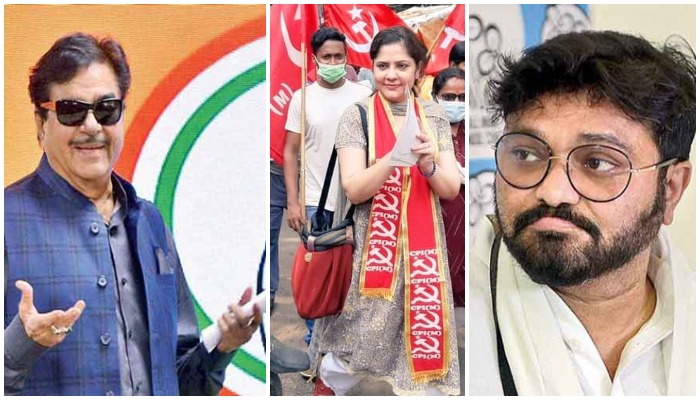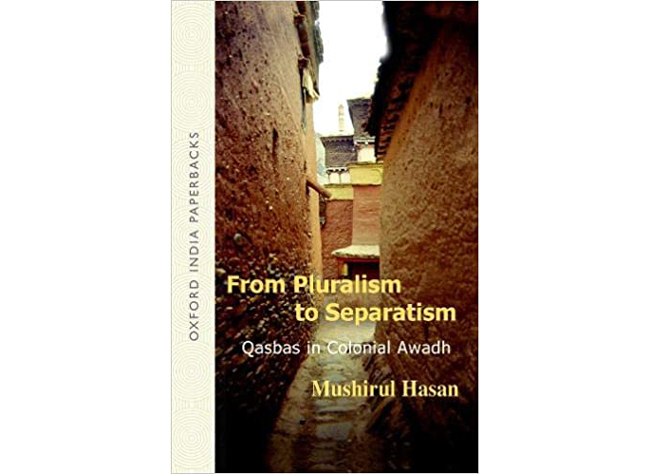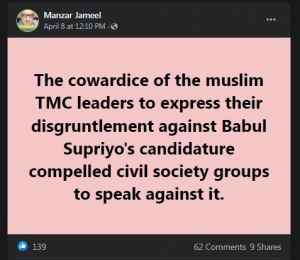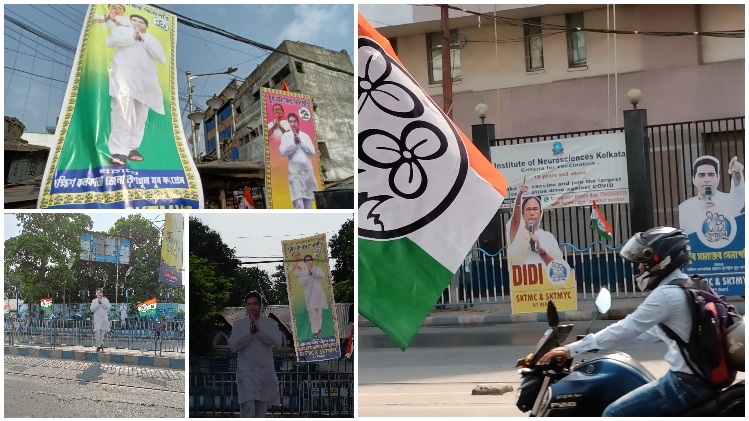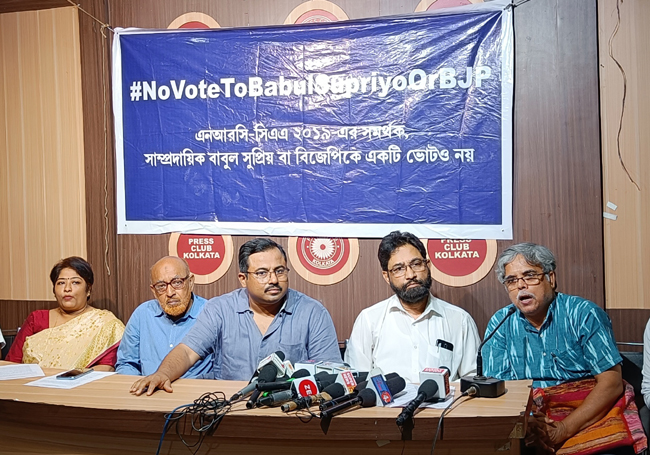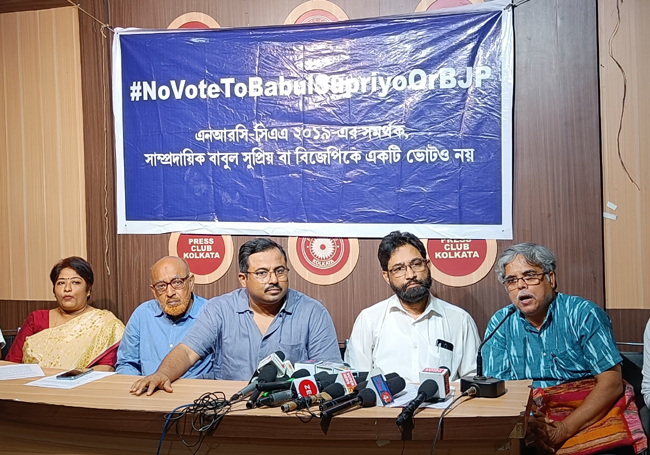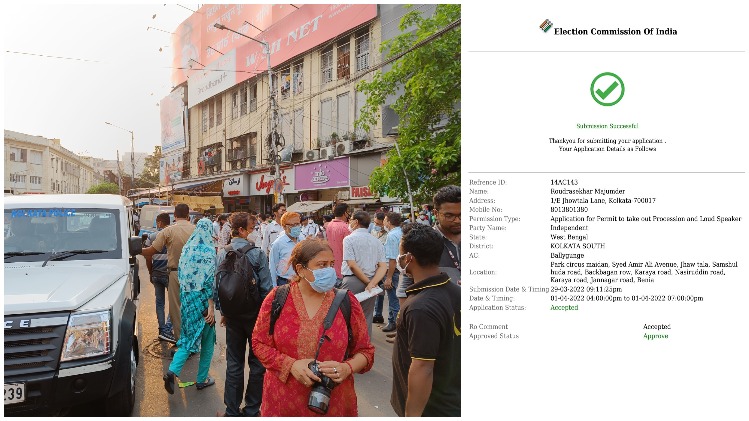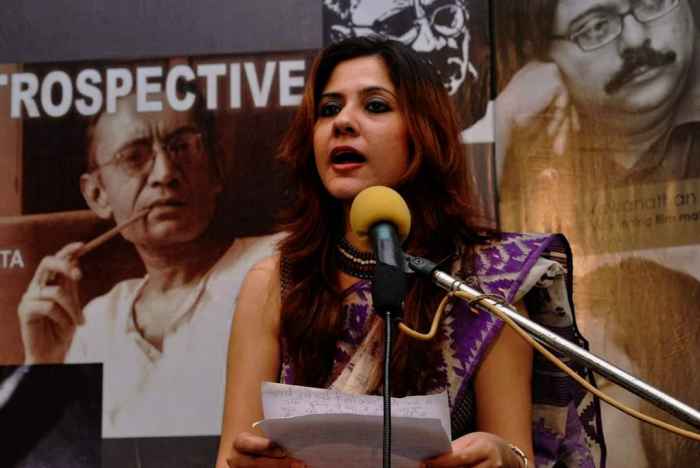आंधारी; अस्सी साल की एक बुर्जुग महिला मातंगी के जीवन पर आधारित उपन्यास है, जो महानगर के काका-नगर कॉलोनी में स्थित सी-100 चौमंजिला इमारत के अंदर संभ्रांत उत्तर भारतीय संयुक्त परिवार की मुखिया हैं, जिनके तीन पीढ़ियों के सगे-संबंधी, कर्मचारी और जीव-जन्तु एक ही छत के नीचे अपनी अलग-अलग रसोई, अलग-अलग खर्च और अलग-अलग निजता के साथ रहते हैं। इस चौमंजिला इमारत के नजदीक एक ऐसा परिवेश और पड़ोस भी है, जिनकी कहानियां सी-100 की कहानी के समानांतर एक रहस्यमयी संसार रचती हैं, जिनके बारे में जानने की इच्छा अंत तक बनी रहती है।
यह कोरोना-काल की अवधि में महामारी से जूझते उस बड़े परिवार की कहानी है, जिसमें लॉकडाउन के दौरान परिवार के सदस्य इस सीमा तक बिखर गए थे कि ज्यादातर तो मातंगी मां के अंतिम संस्कार तक में शरीक नहीं हो सके थे । यह वह दौर था, जब असंख्य शवों को किसी तरह ठिकाने लगाया जा रहा था, जिनके विवरण पढ़ते हुए न जाने कितने लोगों को लगे कि कहीं-न-कहीं उपन्यास में दर्ज अनुभव उनकी ही जिंदगी से जुड़े हैं और आखिरी में जब हम एक भरे-पूरे परिवार को टूटते हुए देखते हैं, तो त्रासदी की नींव पर दूसरी त्रासदियां घटती दिखाई देती हैं। इसके बावजूद यह मातृ-साया के संस्कारों की ही शक्ति होती है, जब विकटतम परिस्थितियों में सभी सदस्य भौतिक तौर पर अलग-थलग रहने के बाद भी भावनात्मक रूप से आपस में साथ ही होते हैं और अपनी-अपनी तरह से मातंगी मां का स्मरण कर रहे होते हैं।
आंधारी; साहित्य अकादमी से सम्मानित नमिता गोखले की अंग्रेजी कृति The Blind Matriarch का हिन्दी अनुवाद है, जिसका अनुवाद हिन्दी के सुप्रसिद्ध लेखक प्रभात रंजन ने किया है। हाल ही में राजकमल प्रकाशन से प्रकाशित 224 पृष्ठों वाला यह उपन्यास विषय, भाव और कहानी को बयां करने के ढंग तीनों स्तरों पर नवीनता लिए हुए है। साहित्य का प्रमुख तत्व संवेदनशीलता का प्रसार माना जाता है, विशेषकर इस दृष्टि से यह उपन्यास पाठकों को अधिक संवेदनशील बनाने की विशेषता रखता है। वहीं, भाषा का सौंदर्य कहानी के विवरणों में है, लेखिका अलग से भाषा का आडंबर रचने की कोशिश करती नजर नहीं आती हैं, बल्कि भाषा कहानी में ही है सधी, सपाट और लयबद्ध। उदाहरण के लिए उपन्यास के शुरुआत में ही एक जगह, ”दोपहर की नींद में उन्होंने कभी उलझे हुए सपने नहीं देखे, लेकिन आज अतीत के कुछ उलझे हुए सपने दिखाई दिए। वह अस्पताल में बिस्तर पर पड़ी थीं, पैर फैलाए, कोई गीत गा रही थीं। दीवार पर एक घड़ी टंगी हुई थी, जिसकी गोल आकृति चांद और सूरज जैसी लग रही थी। आकाश में कहीं एक हवाई जहाज दुर्घटनाग्रस्त होकर जमीन पर गिरा। घड़ी चिड़िया बन गई और कमरे में चक्कर काटने लगी। कुक्कू, कुक्कू, कुक्कू, कुक्कू, खुली खिड़की से बाहर जाते हुए उसने जैसे घोषणा की। उसके बाद सपना टूट गया, गायब हो गया, और वह अपनी राजस्थानी रजाई के नीचे पसीने-पसीने हो रही थीं, तभी लाली उसके लिए चाय और बिस्कुट लेकर आ गई।”
इसी तरह, मातंगी मां के इर्द-गिर्द बुनी कहानी में कई पात्र आते हैं, जिनके बारे में भी अलग से बताने की बजाय कहानी के क्रम में ही अलग-अलग अंतराल में बताते हुए आगे बढ़ा गया है, कहने का अर्थ है कि कहानी प्रधान है, भाषा की तरह इसमें शामिल कई सारे पात्र भी कहानी के प्रवाह में हैं, पढ़ते हुए जबरन लादे गए नहीं लगते हैं, पात्र खासी संख्या में हैं और एक के बाद एक तीव्र गति से आते हैं, जिस प्रकार संयुक्त परिवार में कई सारे पात्र इसी तरह शामिल रहते हैं और आते-जाते हैं, ठीक उसी प्रकार मातंगी मां के आसपास पोता राहुल, पुत्र सतीश, बहू रीतिका, बड़ा पुत्र सूर्यवीर, पुत्री शांता, सूर्यवीर का गोद लिया पुत्र समीर, सेविका लाली और मुन्नी, लाली का रिश्तेदार भतीजा पप्पू, ट्रम्प नाम की बिल्ली, डाबर नाम का कुत्ता, महिला इंस्पेक्टर बबली तथा सेन दंपत्ति घिरे रहते हैं। इन पात्रों की संख्या से भी जाहिर होता है कि एक कहानी में कितनी सारी छोटी-बड़ी कहानियां गुंथी पड़ी हैं, जहां एक हद के बाद चीजों की व्याख्या करना जटिल लगने लगता है, लेकिन उन्हें पढ़ते हुए सब स्पष्ट होता जाता है। देखा जाए तो यह 2022 की ताजा तरीन कहानी है जिसका सिरा 1930 के दशक तक जाता है, जिसमें बहुत कुछ पूरा है, फिर भी ज्यादातर अधूरा ही।
आंधारी की नजर से समकालीन भारत का परिदृश्य
उपन्यास में कहीं भी प्रत्यक्ष या परोक्ष तौर पर मातंगी को ‘आंधारी’ नहीं कहा गया है। इसके बावजूद, हिन्दी में उपन्यास का नाम ‘आंधारी’ नाम दिया गया है। दरअसल, मातंगी का चरित्र अंधेपन के आजू-बाजू तैयार हुआ है, जिसमें उनकी आंखों की रोशनी कमजोर पड़ते हुए आखिरी में हमेशा के लिए चली जाती है। कोरोना-काल में जब वह दूसरी बार दूरदर्शन पर महाभारत धारावाहिक का एपिसोड सुन रही होती हैं, तो उनका ध्यान वर्ष 1988 में लौटता है। उस मिथकीय धारावाहिक के संवादों को सुनकर जैसे उनके दिल में धक से लगता था। राजा धृतराष्ट्र, अम्बिका और विचित्रवीर्य का पुत्र जन्म से अंधा। धृतराष्ट्र ने कंधार की राजकुमारी गांधारी से विवाह किया था, गांधारी ने विवाह के बाद अपनी आंखों पर पट्टी बांधकर देखना छोड़ दिया था। (पृष्ठ-126, 127)
यह उपन्यास समकालीन भारत और विशेष तौर पर हिन्दी पट्टी को भलीभांति विश्लेषित करता है, जिसमें हिन्दी साहित्य की कविताएं, हिन्दी न्यूज चैनलों के समाचार, हिन्दी धारावाहिक, बॉलीवुड फिल्में और उनके अभिनेता-अभिनेत्री क्रमश: कोरोना-काल में राष्ट्रीय व अंतरराष्ट्रीय राजनीति की छाया में मौजूदा समाज के सामयिक संकट से जुड़ते जाते हैं। जैसे कि कहानी के क्रम में एक जगह, ”शांता ने टेलीविजन चला दिया, वह किसी ऐसे चैनल की तलाश में लग गई जो कोरोना वायरस को लेकर पगलाया हुआ नहीं हो। एक चैनल पर दिखा कि मध्य-प्रदेश की सरकार के सामने चुनौती खड़ी हो गई है। विधायकों को बंधक बनाकर रखा गया था। ‘राजनीति का नाटक हमेशा मनोरंजक होता है,’ उसने अपने आप से कहा, ‘और शिक्षा देने वाला भी।’ लेकिन, पांच मिनट समाचार देखने के बाद उसने टेलिविजन बंद कर दिया। (पृष्ठ-28, 29)
आज के दौर में जब वाम और दक्षिण पंथ की वैचारिकी पहले से कहीं अधिक आक्रामक, संगठित और सतह पर आकर टकरा रही है, तब पोपले गालों और झुर्रीदार हाथों से धीरे- धीरे रुमाल पर बारीक कढ़ाई करने वाली मातंगी मां जैसा चरित्र संबल देता है, जिनमें अपने परिवार को संभालने के लिए सैनिक जैसा साहस और संतों जैसा धीरज सुकून का भाव है। एक सरल लेकिन विशिष्ट घरेलू महिला की संवेदनशीलता सत्ता-पोषित वैचारिकी पर कहीं अधिक भारी जान पड़ती है, जिनके भीतर मानवीय तथा समतामूलक स्वभाव का ऐसा पक्ष सामने आता है जिसमें कहीं किसी तरह का स्वार्थ नहीं है, यहां तक की आसपास के जीव-जंतुओं के प्रति तक भेद नहीं है। सियासी स्वार्थ सिद्धी के समय में सी-100 की कांच की-सी दुनिया का हर पात्र कितना मासूम, भोला और प्यारा नजर आता है, क्योंकि वह एक मातृ-साया के संस्कारों में जो पला और बढ़ा है। उपन्यास को पढ़ते हुए बारम्बार यही लगता है कि हम पत्थर वाली दुनिया के लोग नर्म दुनिया के लोगों के बारे में पढ़ रहे हैं, जो महामारी के चलते जब ढहता हुआ दिखता है तो बड़ी पीड़ा होती है और खुद को असहाय पाते हैं।
कहीं हम एक परिवार थे
बाजारवाद की चपेट में पल रही हमारी पीढ़ी जो हर भाव और चीज को मोल-भाव की दृष्टि से देखती है, जब कभी कोरोना की विभीषिका को दोबारा पढ़ेगी तो उसे पढ़ते हुए यह हैरानी भी हो सकती है और समझने में मुश्किल भी कि भारत में ऐसे बड़े परिवार वर्ष 2020-22 तक भी शेष थे, जो साथ रहते हुए भावनात्मक स्तर पर परस्पर एक-दूजे से इस सीमा तक जुड़े हुए थे कि घर के कर्मचारी और पड़ोसी भी कहीं-न-कहीं परिवार के ही हिस्सा थे, जहां मातंगी मां का ढहना असल में भारतीय संयुक्त परिवार का ढहना है, जिसके अवशेष के रूप में उनके पुत्र, पुत्री, नाते, रिश्तेदारों की कहानियां रह जाती हैं, जो उपसंहार में बारी-बारी से आती हैं।
वहीं, उपन्यास में बार्बेट चिड़िया का रूपांकन बड़ी बारीकी से आता है। इस लिहाज से एक झलक देखें तो, ”खिड़की से नीम का पुराना पेड़ दिखाई दे रहा था, जिसकी शाख पर बार्बेट चिड़िया गा रही थी। टू-हे-टू-हे। क्या यह पिछले साल की बात है, जब उनको चिड़िया मिली थी, सड़क के किनारे सेमल के पेड़ के नीचे घायल पड़ी हुई? असहाय, अजीब-सी, अभी उसने उड़ना भी नहीं सीखा था।…”लाली ने चिड़िया की देखभाल की थी, ताकि उसके पंख के घाव भर जाएं और फिर एक दिन वह उड़ जाए। दूसरी ओर, घायल चिड़िया को पकड़ने और पुन: उसे उड़ाने की कड़ी में समीर भी लाली के साथ बार्बेट चिड़िया से सह-संबंध स्थापित करके अपनी-अपनी कहानियों से जुड़ी मनोदशा बयां कर रहे होते हैं। (पृष्ठ-95, 96)
इसी तारतम्य में कहानी और चरित्रों के भाव परिवेश और परिवेश के प्रतीकों से जुड़ते हैं। जैसे कि बार्बेट चिड़िया को ही केंद्र में रखते हुए देखें तो यह चिड़िया कथानक में दो से तीन बार आती है। कभी मातंगी मां उसके साथ उड़ने की अभिव्यक्ति जाहिर करती हैं, तो कहीं समीर उसकी आवाज में खुद के लिए भविष्य के संकेत ढूंढ़ रहा होता है-”बता दे, बता दे, बता दे।” (पृष्ठ-195)
और अंत में कोरोना का अभिशप्त कर देने वाला समय पीछे छूट गया था, जहां सब पहले जैसा था और नहीं भी था। कितना विकट समय था जब देश की हालत चरमराई हुई थी, और दिल्ली, मुंबई में लॉकडाउन लगा था, तब मातंगी मां की मौत अपने घर से बहुत दूर उत्तर भारत के पहाड़ों पर होती है, लेकिन अंतिम संस्कार के लिए उनकी पुत्री शांता के साथ लाली और समीर ही रह जाते हैं। संयुक्त परिवार के बाकी सदस्य उन्हें अलविदा तक नहीं कह पाते हैं।
कुल मिलाकर, उपन्यास के आखिर में कही गई यह बात ही जैसे इसका सार भी है, ”कहीं हम एक परिवार थे, भारत एक देश, वह एक वायरस ही नहीं था, एक राक्षसी बीज था…।” विक्रम संवत 2078। एक काल का अंत था। एक युग का अंत।



